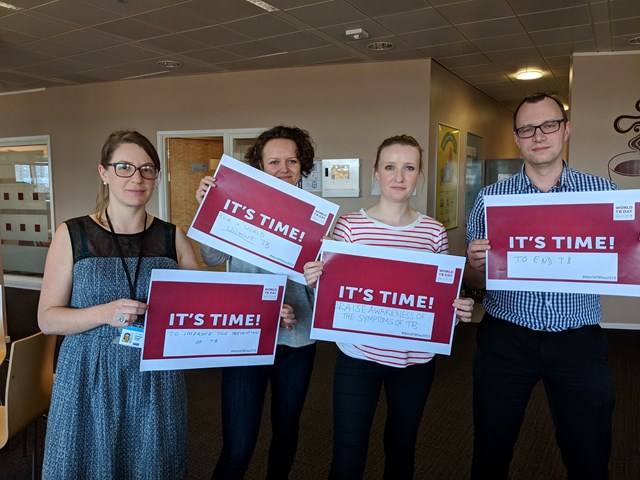New cases of tuberculosis (TB) in England have fallen to the lowest levels since records began. The new data published by Public Health England comes ahead of World TB Day on Sunday 24 March.
Following action by PHE and the NHS locally, there was a 31% drop in new diagnoses in the South West from the peak in 2013 to 2017 (from 326 cases to 234 cases). The region has also seen a 2% fall in diagnoses between 2016 and 2017.
TB is an infectious disease that usually affects the lungs. The most common symptoms of TB are a persistent cough for more than three weeks, unexplained weight loss, fever and night sweats. Although TB can be fatal if left untreated, it is curable for the majority with a course of antibiotics.
In the South West, figures from 2017 show that TB rates remain low across the region with a rate of 4.2 per 100,000 population. However. there are still areas within the region with higher rates including Bristol with a rate of 13.5 per 100,000, Swindon at 11.3 per 100,000 and Plymouth at 8 per 100,000.
While huge strides have been made in reducing TB rates, further work needs to be done to eliminate the disease in England. The most deprived 10% of the population have a rate of TB more than 7 times higher than the least deprived 10%, and people born outside the UK have a rate 13 times higher than people born in the UK. People, especially those from these communities, should be aware of the symptoms and make sure they visit their GP if they are concerned.
Public Health England has played a key role in driving down the rates of TB in England, working with NHS England and other partner organisations to implement the ‘Collaborative Tuberculosis Strategy for England 2015-2020’. This includes raising awareness and tackling TB in under-served populations, implementing schemes to ensure at risk groups successfully complete treatment, and strengthening surveillance and monitoring.
The South of England TB Control Board, one of seven TB Control Boards across England, brings together PHE, local authority public health specialists, the NHS, NHS England, local commissioners and others to work to control TB in their area.
Dr Charles Irish, TB lead for Public Health England South West said:
“The South West picture reflects what is happening nationally and it is great news that rates across the region are at very low levels.
In areas of higher incidence, we know that more work needs to be done to reduce the numbers of people becoming ill and that’s why as part of World TB Day, we are asking health care professionals across the region to remind themselves of the signs and symptoms of Tuberculosis and ‘think TB’.
The most common symptom is a persistent cough that lasts for more than three weeks, unexplained weight loss, fever and night sweats.
If a patient presents with these symptoms, please ‘think TB’ and arrange for a chest X-ray and sputum test.
It is also important for health professionals to be aware that the risk factors for tuberculosis include a weakened immune system, poor quality housing, homelessness, alcohol and substance misuse or time spent in a country with high TB rates or previous imprisonment.”
Dr Ayoola Oyinloye, Consultant in Public Health Medicine at Swindon Borough Council said:
“Swindon has made great strides in understanding the trends of people diagnosed with Tuberculosis.
While the rate of people diagnosed with Tuberculosis is not failing in line with the rest of the country, we are working with general practices, faith and voluntary groups to improve awareness of symptoms of Tuberculosis.
We have a comprehensive programme of vaccination for TB for eligible infants.”
Dr Ruth Harrell, Director of Public Health for Plymouth City Council, said:
“Rates of TB are generally higher in urban areas and Plymouth is no different.
Though numbers are small, we’d like to see this drop even further.
That is why the local authority is working very closely with the NHS and Public Health England to make sure that TB is detected early, and that anyone with TB has the support they need to get better.”
Christina Gray, Director of Public Health for Bristol City Council said it was important for people to know the symptoms of TB and to contact their GP early:
“While it is encouraging to see that cases of TB in England have fallen to the lowest levels since records began, we are working proactively in Bristol with local communities, particularly with those who may have a higher risk of being in contact with TB, to help identify cases, as well as holding systematic screenings to address the spread of the disease.
“However, it is important to remember that TB is difficult to catch, is not easily passed from person to person and can be treated easily with antibiotics.
We are supporting Public Health England to raise awareness of the disease because spotting the symptoms early and seeking treatment is key to ending TB.”
More information about TB can be found at https://www.nhs.uk/conditions/tuberculosis-tb/.
The collaborative tuberculosis strategy for England: 2015 to 2020 can be found here: https://www.gov.uk/government/publications/collaborative-tuberculosis-strategy-for-england

You can join us on our social media pages, follow us on Facebook or Twitter and keep up to date with whats going on in South Devon.
Got a news story, blog or press release that you’d like to share or want to advertise with us? Contact us




























